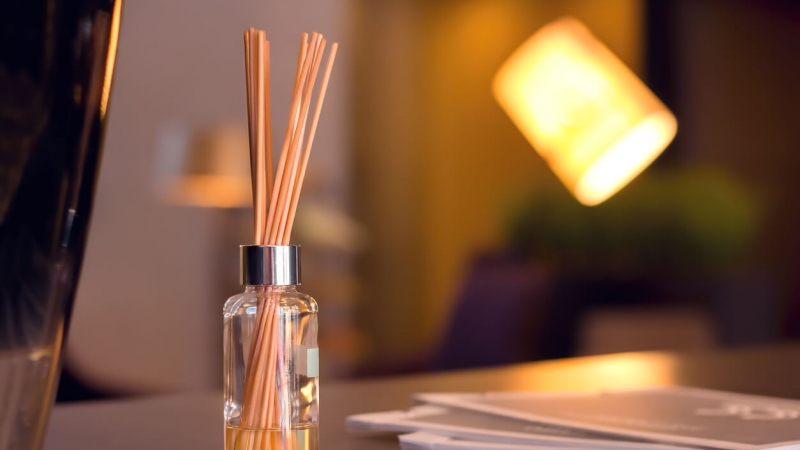When you enter a new place, whether it’s someone’s home or a hotel, the atmosphere significantly impacts your perception of the space. From layout to lighting, we absorb everything we sense simultaneously, with scent playing a critical role in the impression we form. Hospitals tend to have a sterile smell, exuding a sense of cleanliness; bakeries smell sweet and inviting, enticing passersby to stop in for a bite. Good or bad, every location has a scent—hotels included—which begs the question, “Why do hotels smell so good?”
Whether you’re a hotelier or traveler, you’ve probably noticed that most hotels smell incredible. But why? Why do hotels smell so good? Is it natural? Where does it come from? Do different hotels have unique smells? More importantly, why does any of this matter? We’re unlocking the answers to those questions and more.
Why do hotels smell so good?
Hotels use different scents to produce a sensation or feeling in their guests, usually relaxation, warmth, or nostalgia. These scents are used to enhance the guest experience by making them feel comfortable and at home.
The ability to smell is one of our most powerful senses, with strong ties to emotion and memory. A scent can make you feel at ease or notify you of danger. It can evoke long-forgotten memories and help individuals connect more closely to a particular person or place. Smells play a leading role in our daily lives and well-being, even though we may not realize it.
How do different smells affect us?
Psychological and scientific research has taught us a lot about how our brains work and process information. Olfactory function, or the ability to smell, is the sense most directly linked with memory. Picking up a particular scent can spontaneously spark a memory, often a long-forgotten experience or event. Sense of smell is also closely linked with our emotions, responsible for approximately 75% of the feelings we generate.
The olfactory system holds “odor memory,” the ability to suddenly trigger a vivid memory, emotion, or both. As odors pass through the nose, they travel through the limbic system to the olfactory areas of our brain, which spur memories and feelings without any conscious effort on our part. Our ability to smell also plays a prominent role in forming new memories and processing emotions. It connects our senses to what we see and feel, helping to create and store memories without our awareness.
Specific fragrances can energize you, while others can help you relax before bed. They can evoke powerful emotions like joy, sadness, and romance. Smells may attract you to a specific location or make you avoid it, so it makes sense that every business wants their business to smell appealing to customers. But why does it matter so much in the hospitality industry? Why is smell so important to hotels?
Why do hotels care so much about smell?
As we’ve discovered more about the importance of smell and its impact on our brains, businesses, organizations, and other entities have taken notice—and hotels are no different. The hospitality industry revolves around creating a safe, welcoming space for guests and providing them with the best customer experience possible. Smell plays a part in that experience.
Customers pay attention to everything, even if you don’t think they do. In a 2019 Ambius study analyzing the impact of scent on business performance, 91% of surveyed hotel guests stated that pleasant hotel smells positively impacted their experience, with 67% noting it made them more relaxed.
From the moment a guest enters your hotel, they begin to form a perception of it. Whether a cheerful, welcoming scent or a foul odor greets them can significantly influence their impression of the property, impacting the remainder of their stay. Filling the air with pleasant smells can positively affect guests’ moods, energy, and satisfaction scores.
Due to the close connections to memory and emotion, incorporating smells can lead to a more immersive stay experience, creating a deeper, more meaningful connection between hotels and guests. Many hotels have begun incorporating scent into their interior plans, using lighting, spacing, décor, and smell to create a more welcoming, memorable atmosphere for visitors. Making scent a part of your brand’s experience can also help your hotel outshine the competition and keep guests coming back.
Which hotel scents are the most popular?
One of the key reasons hotels smell so good is they avoid overpowering scents. While hotel fragrances contain many different ingredients, each with a unique bouquet, they complement each other and create a cohesive, blended smell. Some of the most common smells hotel guests encounter include:
- Sandalwood
- Vanilla
- Citrus
- Leather
- Cedar
- White tea
- Black tea
- Lemon blossoms
- Cherry blossoms
- Neroli
- Jasmine
- Lavender
Many of the most popular hospitality scents are herbal with light floral notes, and that’s no coincidence. Fragrances like lavender and jasmine have been shown to reduce anxiety, promote relaxation, and aid in restful sleep—all things guests want from a hotel.
What is a signature hotel scent?
A signature scent is a fragrance designed specifically for the hotel or brand that uses it. Luxury hotels were among the first to involve scent in their brand experience. High-end brands began developing unique scents for their hotels, creating a familiar, distinctive aroma that customers started associating with their properties. Notable innovators include:
One Hotel Scent
One Hotel is a luxury hospitality and lifestyle brand “inspired by nature and socially conscious hospitality.” With properties in New York and Miami, One Hotel promotes values of culture, nature, wellness, and quality experiences. The One Hotel Scent, which includes cedarwood, sandalwood, violet, and eucalyptus, was designed to capture and complement the brand’s mission.
EDITION Scent
EDITION Hotel, a concept developed by hotelier Ian Schrager in partnership with Marriott, was launched in 2012 to cater to a particular market segment: sophisticated travelers seeking memorable, personalized hotel stays. In establishing the brand, Shrager wanted to “infuse emotion into a check-in/check-out world by bringing each location to life in an intimate, seductive environment.” To help with this effort, the brand partnered with famed perfumer Le Labo to develop the EDITION signature scent. The bespoke fragrance combines the aromas of bergamot and black tea to invoke “a sense of comfort and exoticism.”
The Shangri-La Scent
Shangri-La Hotels and Resorts is a luxury hospitality brand based in Hong Kong. Founded in 1971, the brand now operates over 100 properties worldwide, promoting missions of sincerity, respect, and humility—staples of Asian hospitality. Black tea is the core ingredient in The Shangri La Scent, which also offers orange, ginger, cinnamon, and bergamot notes. Also called “Shangri-La Essence,” the smell went viral and is now available as a reed diffuser, room spray, or candle.
Ritz-Carlton signature scents
The Ritz-Carlton goes beyond the call of duty when it comes to signature smells. Not only does every Ritz smell amazing, but each hotel in the brand has a unique signature scent. Although the brand has a global portfolio, with hotels everywhere from Osaka to Denver, the Ritz-Carlton and Air Aroma paired up to create bespoke fragrances for each property. By implementing “unique cultural and natural facets of each area,” every scent is distinct, memorable, and of world-class quality.
Langham Ginger Flower
Another signature scent from Air Aroma, the Langham Ginger Flower fragrance was developed for exclusive use by Langham Hotels. Honeyed pineapple and ginger flower blend to create an enticing and complex but soft aroma. Renowned for its luxury, elegance, and excellent service, Langham was one of the very first hotels to implement a brand-standard signature scent.
While signature scents may have initially taken off with high-end brands, they aren’t just for luxury or upscale boutique hotels. Many well-known, budget-friendly hotel brands have a signature scent; even Super 8 released a candle collection. Now, most chains have a trademark scent.
- Hilton. Hilton’s White Tea & Thyme is a delicately balanced signature scent. The fragrance oil features thyme, coriander, and cucumber in the front. It offers soft notes of white tea leaves in the middle, with light, musky notes rounding off the scent’s finish.
- Westin. Another brand that uses white tea as a primary ingredient, Westin Hotels and Resorts also uses vanilla and cedar in their signature White Tea Scent. The fragrances combine to create a soothing, woodsy atmosphere.
- DoubleTree Hotels. Known for their complimentary freshly baked cookies, DoubleTree understands how to make guests feel at home. ScentAir, founded by a Disney Imagineer, produces the famous fragrance that makes all DoubleTree hotels smell like chocolate chip cookies, which you can purchase right from the brand.
- Hyatt. Hyatt Zen is a signature scent created for Hyatt House and Hyatt Place destinations around the globe. The fragrance promotes a sense of well-being amongst guests with hints of basil, eucalyptus, and lavender.
As you can see, signature scents may vary from one hotel to the next. However, each fragrance has one thing in common: they were expressly designed with the customer in mind.
How are hotel signature scents made?
Professional perfumers are skilled in the art of fragrance creation. They combine raw materials to create specific smells and complex fragrances. After talking to the customer to better understand their goals, brand objectives, and other details, perfumers begin accessing their library of raw materials to find the right scent. This process often takes weeks or months, as perfumers create and test multiple fragrance formulas before finalizing the customer’s signature scent.
Because the testing process is so lengthy, often involving thousands of scent tests, working with a single perfumer takes considerable time. As a result, hotels commonly turn to olfactory branding agencies for help. Agencies like 12.29 Scent are committed to developing fragrances that “create immediate and memorable connections between brands and consumers.”
Tips to make your hotel smell amazing
Whether managing a large, family-friendly property or a quaint bed and breakfast in the country, your hotel should smell good. Follow these tips to keep your business smelling fresh, friendly, and full of guests.
- Keep things clean. Moisture and humidity are the enemies of pleasant-smelling spaces, as they leave a thick, musty scent behind. Prevent moisture buildup and thoroughly clean the property daily to keep things smelling fresh. Regularly deep-clean furniture, fixtures, and soft goods that hold scent, like bedding, mattresses, and carpets.
- Know your customer. How do you want guests to feel at your hotel? What impression do you want them to leave with? Identify your target audience and what appeals to them.
- Explore scents tied to your hotel’s history or destination. Is your area known for a particular crop, pastime, or historical event? Look for fragrances that represent your brand values, mission, and unique location.
- Avoid overly masculine or feminine fragrances. Powerful, distinct smells may alienate some of your guests. Appeal to more consumers with balanced scents.
- Shop for the space. From automated spritzers and countertop diffusers to plug-ins and scent sticks, there are several types of hotel air fresheners to choose from. Avoid over-scenting smaller areas with concentrated diffusers or spray mists; find the right tool for the room.
When someone asks, “Why do hotels smell so good?” you can answer.
Test your newfound knowledge of smell by upgrading your hotel’s fragrance. Rejuvenate the hotel’s atmosphere by making scent a part of your interior design strategy.
New to interior design or hotel décor? Don’t worry; keep reading to learn everything you need to know.









